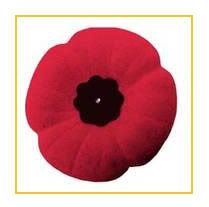 |
I'm re-posting my Flanders Fields post from November 11, 2010.
This Veterans Day/Remembrance Day is more apt than ever.
In Flanders Fields
By Lieutenant Colonel John McCrae, (1872-1918)
In Flanders fields the poppies grow
Between the crosses, row on row,
That mark our place; and in the sky
The larks, still bravely singing, fly
Scarce heard amid the guns below.
We are the Dead. Short days ago
We lived, felt dawn, saw sunset glow,
Loved and were loved, and now we lie,
In Flanders fields.
Take up our quarrel with the foe:
To you from failing hands we throw
The torch; be yours to hold it high.
If ye break faith with us who die
We shall not sleep, though poppies grow
In Flanders fields.
------------------------------------------------------------------------------------
The Last Post
From the Youtube site Terry Lee Canada's channel:
My Remembrance Day -The Last Post / The Rouse
My bugle (Cornet) tribute to Canadian Heroes on the Remembrance Day. I played The Rouse following The Last Post with a short (shorter than usual) silence period.
The "Last Post" call is used to signal the end of the day when the duty officer returns from the tour of the camp and quarters. The call "First Post" is used to mark the start of the inspection. The name derives from the practice of inspecting all the sentry posts around such a camp at the end of the day, and playing a call at each of them. The "Last Post" was thus the last point of this inspection, and the call signalling that this post had been inspected marked the end of the military day.
In addition to its normal garrison use, the Last Post call had another function at the close of a day of battle. It signalled to those who were still out and wounded or separated that the fighting was done, and to follow the sound of the call to find safety and rest. Its use in Remembrance Day ceremonies in Commonwealth nations has two generally unexpressed purposes: The first is an implied summoning of the spirits of the Fallen to the cenotaph, the second is to symbolically end the day so that the period of silence before the Rouse is blown becomes in effect a ritualized night vigil.